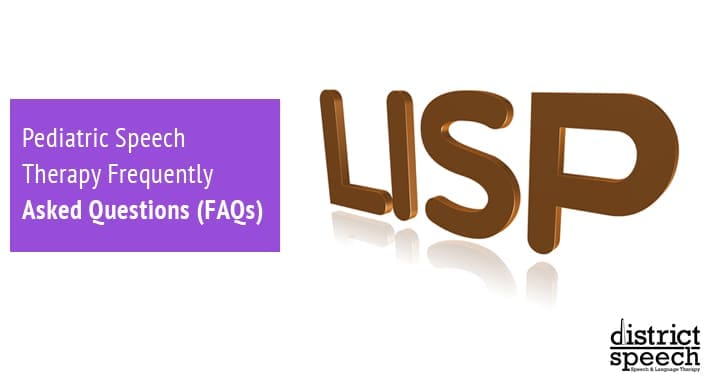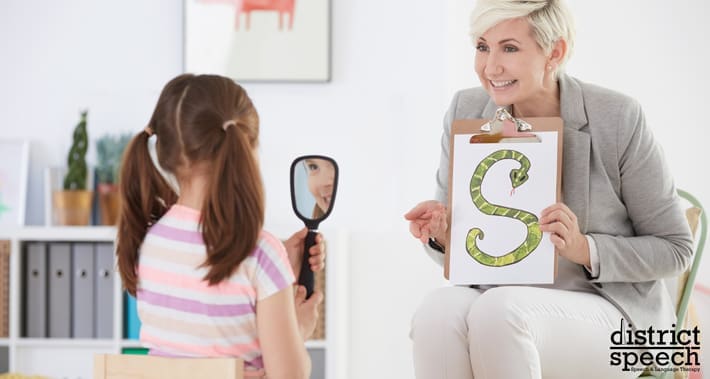
Many young children experience speech and language difficulties.
While some children grow out of these difficulties on their own, others need the help of a speech therapist.
That’s where we step in.
We’re District Speech, a pediatric speech therapy clinic with a passion for helping children reach their fullest potential.
If you are thinking about putting your child in speech therapy, you’ve come to the right place.
In this article, we will address some of the most frequently asked questions regarding pediatric speech therapy.
Keep reading to learn more.
What Does A Speech Therapist For Children Treat?
A speech therapist can help your child’s language and speech development in a variety of areas, including:
- Articulation (speech sounds and intelligibility)
- Receptive language (what your child understands)
- Expressive language (how your child communicates their wants and needs)
- Pragmatics (social language skills)
- Stuttering and fluency
- Feeding difficulties (oral motor, swallowing, and sensory difficulties)
In particular, a pediatric speech therapist can offer:
- Speech therapy for articulation disorders
- Speech therapy for dysgraphia
- Speech therapy for ADHD
- Speech therapy for speech sound disorders
- Speech therapy for children with lisp
- Speech therapy for feeding and swallowing disorders
- Speech therapy for children with Down syndrome
- Speech therapy for stuttering
- Speech therapy for orofacial myofunctional disorder
- Speech therapy for cleft lip and cleft palate
- And much more
Why Do Speech Therapists Emphasize Early Intervention So Much?
Pediatric speech and language difficulties may affect your child’s reading, writing, and overall learning skills.
Additionally, children who struggle with their speech and language skills often suffer social consequences, such as bullying and difficulty making friends.
Left untreated, these difficulties can have lifelong effects.
For instance, adults with speech and language difficulties often experience difficulties at work and in their personal lives.
Studies show that when children receive treatment for their speech disorders before age three, treatment tends to be more effective.
Therefore, we strongly encourage early intervention speech therapy.
How Many Speech Therapy Treatments Will My Child Need?
Every child is unique.
Your duration of your child’s treatment will depend on their specific difficulties.
For example, a child who has a combination of speech or language difficulties may require more treatments than a child who only stutters.
At the evaluation, your child’s speech therapist will come up with a treatment plan that takes your child’s unique needs into consideration.
Do I Need A Doctor’s Referral To See A Pediatric Speech Therapist?
Not necessarily.
Speech therapists are qualified to assess your child without any outside referrals.
However, some insurance companies require a doctor’s referral before they authorize any fees.
Consult your individual insurance plan for more details.
What Should I Do If My Child Has A Lisp?
A lisp is a speech impediment that effects the pronunciation of s and z sounds.
Since many children don’t learn to master these sounds until the age of 7 or 8, lisps amongst younger children are common.
Although lisps don’t typically interfere with how well a child is understood, it may lead to self esteem issues or bullying.
If your child has a lisp, you can help them by modeling s sounds by making a big smile and emphasize the spreading of your lips as the sound passes through.
You can also use fun ways to remind your child to keep their tongue in their mouth when they are pronouncing s and z sounds.
What Should I Do If My Child Stutters
Like lisps, stuttering is a common occurrence amongst children.
Many children will temporarily stutter due to excitement.
However, persistent stuttering may indicate an underlying speech or language difficulty.
Contact a speech therapist if you notice that your child has been stuttering frequently for a period longer than a few weeks.
We can help you with how to support your child who stutters, as well as provide speech therapy treatments.
Can A Child Learn More Than One Language?
Absolutely.
In fact, learning multiple languages is excellent for your child’s overall speech, language, and learning skills.
Children who are multilingual may also find it easier to become proficient in additional languages.
Other benefits of teaching your child multiple languages include:
- Development of a larger vocabulary
- Better understanding of word sounds and rhythm, which also helps writing and spelling
- Having access to multiple cultures

How Does A Speech Therapy Evaluation Work?
During the initial evaluation, your child’s speech therapist will assess your child’s speech and language skills in multiple areas, including:
- How your child communicates (pronunciation, voice, and fluency)
- Your child’s language expression (vocabulary, grammar, and sentence structure)
- Your child’s play and social communication skills (body language, eye contact, and greetings)
In order to better understand your child’s unique situation, your child’s speech therapist will also conduct a parent or caregiver interview.
Book Your Appointment With District Speech Today
Is your child struggling with their speech and language skills?
Regardless of your child’s specific speech and language difficulties, we are here to help.
At District Speech and Language Therapy, our team of expert speech therapists have a passion for helping children overcome their difficulties.
If you would like to learn more about our services, don’t hesitate to contact us.
Book an appointment with District Speech today to get started.
1300 I St NW, Suite 400 E,
Washington, DC 20005
- https://g.page/districtspeech
District Speech and Language Therapy specializes in speech therapy, physical therapy, and occupational therapy solutions, for both children and adults, in the Washington D.C and the Arlington Virginia areas.